Academic
Writing for
Graduate
Students
�
Contents
Introduction to the Third Edition
UNIT ONE: An Approach to Academic Writing
Audience
Purpose and Strategy
Organization
Style
Language Focus: The Vocabulary Shift—Verbs
Language Focus: The Vocabulary Shift—Nouns and
Other Parts of Speech
Language Focus: Other Stylistic Features
Flow
Language Focus: Linking Words and Phrases
Presentation
Positioning
UNIT TWO: General-Specific and Specific-General Texts
Opening with General Statements
Opening with Statistics
Opening with Definitions
Writing a Definition
Some Common Ways to Define in Academic Writing
Language Focus: Verbs in Defining and Naming
A Brief Look at the Elements of Formal Sentence Definitions
Extended Definitions
Variations in Definitions
Discussions of Schools of Thought
Specific-to-General Organization
UNIT THREE: Problem, Process, and Solution
The Structure of Problem-Solution Texts
Language Focus: Mid-Position Adverbs
Procedures and Processes
Language Focus: -ing Clauses to Indicate Cause and Effect
Language Focus: Passive Voice
Flow of Ideas in a Process Description
vii
1
4
6
8
14
17
20
22
30
37
48
53
55
61
64
65
65
67
68
71
74
84
89
92
100
101
105
108
115
119
125
iii
Academic Writing for Graduate Students, 3rd Edition: Essential Skills and Tasks John M. Swales & Christine B. Feak http://www.press.umich.edu/titleDetailDesc.do?id=2173936 Michigan ELT, 2012 �
iv
CONTENTS
Language Focus: Indirect Questions
Introducing the Solution
UNIT FOUR: Data Commentary
Strength of Claim
Structure of Data Commentary
Location Elements and Summaries
Language Focus: Verbs in Indicative and Informative
Location Statements
Language Focus: Linking as Clauses
Highlighting Statements
Language Focus: An Introduction to Qualifications and
Strength of Claim
Language Focus: Specific Ways of Moderating or Qualifying
a Claim
133
137
139
139
144
147
149
152
156
156
159
165
Organization
167
Language Focus: Comparisons
Concluding a Commentary
172
Language Focus: Dealing with Unexpected Outcomes or “Problems” 174
177
Dealing with Graphs
Dealing with Chronological Data
181
183
Language Focus: Prepositions of Time
UNIT FIVE: Writing Summaries
Considerations before Writing a Summary
Some Notes on Plagiarism
Paraphrasing
Careful Use of Synonyms
Language Focus: Identifying the Source
Language Focus: Summary Reminder Phrases
Syntheses of More than One Source
Language Focus: Showing Similarities and Differences
UNIT SIX: Writing Critiques
Book Reviews
Language Focus: Stating Opinions
Language Focus: Evaluative Language
Evaluating a Published Article
Language Focus: Unreal Conditionals
Language Focus: Evaluative Language Revisited
188
189
196
202
206
211
216
220
225
228
230
239
242
248
260
262
Academic Writing for Graduate Students, 3rd Edition: Essential Skills and Tasks John M. Swales & Christine B. Feak http://www.press.umich.edu/titleDetailDesc.do?id=2173936 Michigan ELT, 2012 �
CONTENTS
Critical Reading
Language Focus: Beginning the Critique
Language Focus: Inversions
Reaction Papers
Language Focus: Non-Standard Quotation Marks (Scare Quotes)
A Few Thoughts on Manuscript Reviews for a Journal
UNIT SEVEN: Constructing a Research Paper I
Types of Journal Publication
Short Communications (SCs) in Disciplines that Report Fieldwork
Longer Research Papers
Methods Sections
Language Focus: Linking Phrases in Methods Sections
Results Sections
Language Focus: Another Look at Location Statements
Language Focus: Special Verb Agreements
Language Focus: Making Comparisons
UNIT EIGHT: Constructing a Research Paper II
Introductions
Creating a Research Space
Language Focus: Citation and Tense
Language Focus: Negative Openings in Move 2
Language Focus: Purpose Statements and Tense
Discussion Sections
Language Focus: Levels of Generalization
Language Focus: Expressions of Limitation
Unfinished Business
Appendixes
Appendix One: The Grammar of Definitions
Appendix Two: Articles in Academic Writing
Appendix Three: Academic English and Latin Phrases
References
Index
v
265
268
269
270
274
276
277
278
280
284
289
301
305
309
314
316
327
327
331
344
350
356
363
371
372
378
390
390
395
403
407
415
Academic Writing for Graduate Students, 3rd Edition: Essential Skills and Tasks John M. Swales & Christine B. Feak http://www.press.umich.edu/titleDetailDesc.do?id=2173936 Michigan ELT, 2012 �
Introduction to
the Third Edition
The Changing Scene
The second edition of Academic Writing for Graduate Students (henceforth
AWG) was published in 2004. In the ensuing eight years, many of the
important trends we identified in that edition’s Introduction—in North
America and elsewhere—have developed further. Email and the internet are
now nearly universal, especially since the spread of wireless technologies.
Graduate degrees available or partly available online have been increasing
rapidly. The American tradition of requiring doctoral students to take
courses has been adopted and adapted by more and more countries. Co-
authorship of papers written by graduate students and their professors
and/or advisors continues to increase. Doctoral students are attending and
presenting at more conferences and are doing so at earlier stages in their
PhD programs. As a result of these trends, graduate students and junior
researchers are much more networked than they were 20 years ago; indeed,
the 2010 book by Lillis and Curry, Academic Writing in a Global Context,
provides compelling evidence of the advantages today of operating within
and through networks. Several other scholars have also been emphasizing
that academic writing today is much more of a collaborative activity than it
used to be. The growth of research groups, writing circles, close mentoring,
and email have all contributed to our growing understanding that writing is
increasingly embedded in social and professional contexts (e.g., Bhatia,
2004; Molle & Prior, 2008). Although this book focuses on academic writ-
ing, we also recognize that it is often mediated by academic speech.
Further, those with overall responsibility for graduate education, such as
graduate schools, are offering more workshops for graduate students, many
of whom are often concerned with strengthening communication skills in
some way. Finally, the traditional distinction between native and non-
native speakers of English continues to erode. In the research world, in par-
ticular, there are today increasing numbers of “expert users” of English who
are not traditional native speakers of that language. This has given rise, in
recent years, to the English as a Lingua Franca (ELF) phenomenon whereby
these expert users, as well as those with lower English language proficiency,
communicate with each other on matters of research, scholarly, or business
vii
Academic Writing for Graduate Students, 3rd Edition: Essential Skills and Tasks John M. Swales & Christine B. Feak http://www.press.umich.edu/titleDetailDesc.do?id=2173936 Michigan ELT, 2012�
viii
INTRODUCTION TO THE THIRD EDITION
interest. One further piece of evidence for this trend is the increasing spread
of English-medium post-secondary instruction at universities in non-Anglo-
phone countries.
When AWG was originally published in 1994, the number of courses in
academic writing for graduate students was both rather small and largely
restricted to entering international graduate students. Nearly 20 years later,
both the number and range of these courses have increased as graduate stu-
dents move around the world in growing numbers and as recognition grows
that increasing numbers of native speakers of English would welcome, for
various reasons, some assistance with their academic writing. As part and
parcel of these developments, research in English for Academic Purposes
(EAP) has advanced, partly through dissertation-level studies on various
aspects of academic discourse; leading examples of this trend are China,
Iran, Italy, and Spain. It is clearly time for a third edition!
In the years between the previous edition and this one, there have also been
changes in our personal circumstances. John officially retired in 2007, but he
maintains a university office, interacts with doctoral students, and keeps busy
as a researcher, materials writer, reviewer, guest lecturer, and conference
speaker. Overall, he feels he is keeping up to date with events in the global
world of EAP. Meanwhile, Chris has taken over and further developed the
English Language Institute’s advanced courses in dissertation writing and writ-
ing for publication. She also gives frequent workshops, both at Michigan and
elsewhere, and is increasingly invited to speak at international conferences.
Approach and Organization
A third edition of an EAP textbook usually indicates that the first two have
enjoyed some success. And this has been the case with AWG. As a result, we
have largely retained the basic approach of the previous editions. This
approach can be spelled out in this way.
• The book has evolved out of both research and teaching experience.
• It is as much concerned with developing academic writers as it is with
improving academic texts.
• The book is conceived as providing assistance with writing part-genres
(problem-solutions, methods, and discussions) and genres (book
reviews and research papers).
• It is targeted at graduate students (although we have heard of its suc-
cessful use with advanced undergraduates). These graduate students
Academic Writing for Graduate Students, 3rd Edition: Essential Skills and Tasks John M. Swales & Christine B. Feak http://www.press.umich.edu/titleDetailDesc.do?id=2173936 Michigan ELT, 2012�
INTRODUCTION TO THE THIRD EDITION
ix
may variously be internationals with limited experience writing aca-
demic English, “proficient users” with a first language other than Eng-
lish, and native speakers of English. The last group in particular may
not need to pay as much attention to the Language Focus sections in
this volume.
• The general approach is analytical and rhetorical: Users are asked to
apply their analytical skills to the discourses of their chosen disciplines
and to explore how effective academic writing is achieved. In effect, we
are strong believers in this cycle, which is fashionably known as rhetor-
ical consciousness raising:
Achievement
Analysis
Acquisition
Awareness
• The tasks and activities are richly varied, ranging from small-scale lan-
guage points to issues of how graduate students can best “position”
themselves as junior researchers.
• The book is fairly fast paced, opening with a basic orientation and clos-
ing with writing an article for publication.
• With the help of the accompanying Commentary, scholars and students
should be able to use this volume profitably on their own.
We have also largely retained the original eight-unit organization because
nearly all the reports we have received suggest that users are happy with it.
• The first four units are essentially preparatory; they pave the way for
the more genre-specific activities in later units.
• Unit One presents an overview of the considerations involved in suc-
cessful academic writing, with a deliberate stress on early exposure to
the concept of positioning.
Academic Writing for Graduate Students, 3rd Edition: Essential Skills and Tasks John M. Swales & Christine B. Feak http://www.press.umich.edu/titleDetailDesc.do?id=2173936 Michigan ELT, 2012�
x
INTRODUCTION TO THE THIRD EDITION
• Units Two and Three deal with two overarching patterns in English
expository prose: the movement from general to specific and the move-
ment from problem to solution.
• Unit Four acts as a crucial link between the earlier and later units since
it deals with how to handle interpretation and discussion of data.
• Units Five and Six then deal with writing summaries and critiques,
respectively.
• Finally, Units Seven and Eight deal with constructing a real research
paper—that is, one that attempts to make an original contribution to
the field.
Changes in the Text
Within this retained basic approach and structure, there are, however, also a
number of important changes. Many of the older sets of data and older texts
have either been updated or replaced. Even so, in response to user pressure,
we have kept a number of instructor “favorites,” such as the test-retest data
in Unit Four. Although the range of disciplines represented remains large,
we have, again in response to user requests, somewhat increased the material
from the hard sciences and Engineering. Among other changes, an impor-
tant one has been a sharp reduction in the attention to the grammar of def-
initions in Unit Two, which is now relegated to an appendix. The space
created has allowed for a new closing section to this unit that deals with the
kinds of specific-general texts that can be found in the humanities.
Throughout, new findings (both published and our own) from discourse
analysis have been incorporated. Another important innovation has been
our use of the Michigan Corpus of Upper-level Student Papers (MICUSP),
which became freely available in 2009 (see www.elicorpora.info/). This cor-
pus consists of an electronically searchable collection of 830 top-rated stu-
dent papers at the University of Michigan, representing 16 disciplines and
consisting of work submitted by final year undergraduates and graduate stu-
dents in their first three years.
AWG has been designed as a first course in graduate-level writing and is
most suited to the first two years of graduate education. For the later course
work, there is English in Today’s Research World: A Writing Guide (ETRW),
published by the University of Michigan Press in 2000. This has been
replaced by some more specialized mini-volumes, all published by the Uni-
versity of Michigan Press (see www.press.umich.edu/esl/compsite/ETRW/).
Academic Writing for Graduate Students, 3rd Edition: Essential Skills and Tasks John M. Swales & Christine B. Feak http://www.press.umich.edu/titleDetailDesc.do?id=2173936 Michigan ELT, 2012�
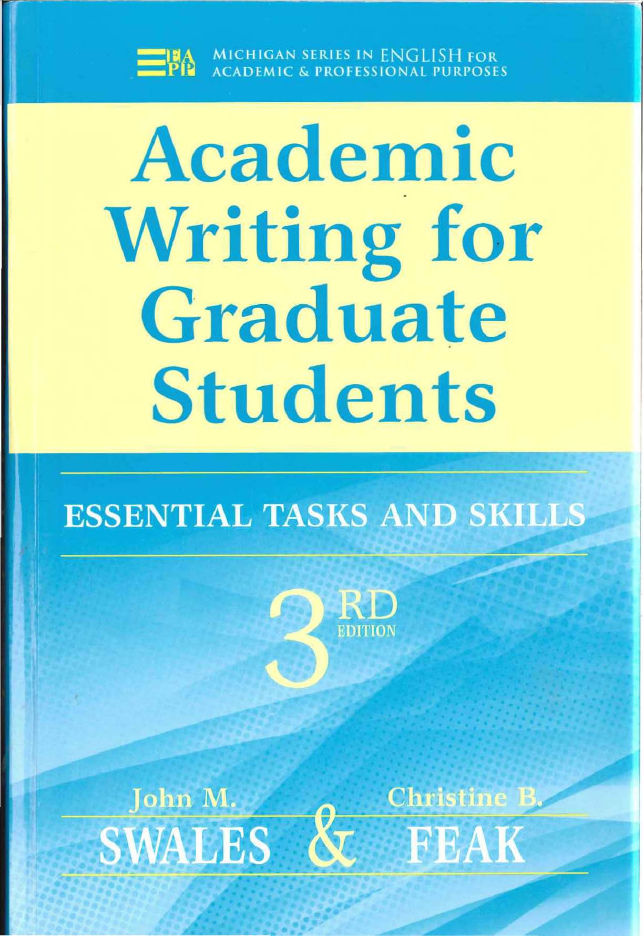
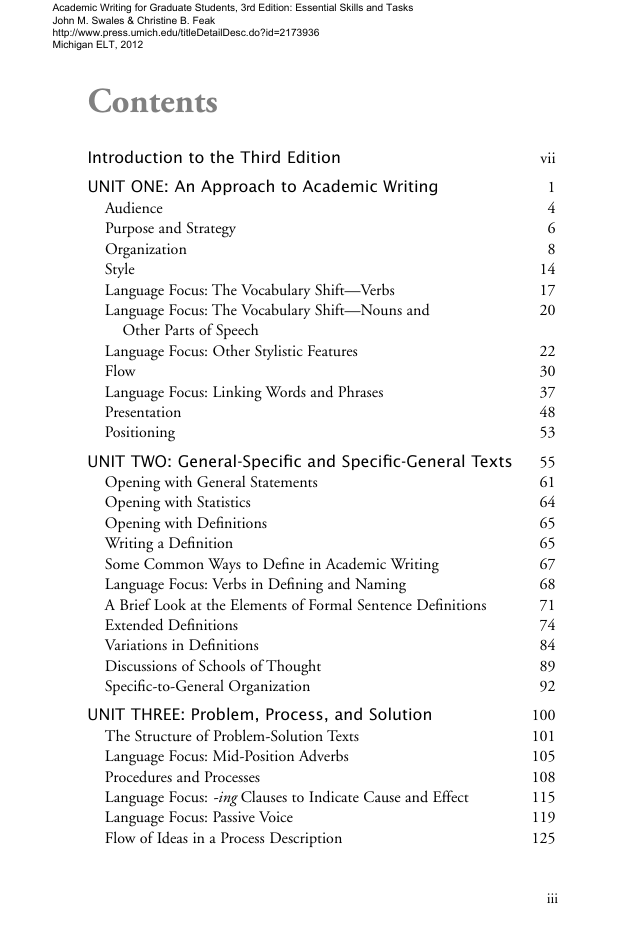
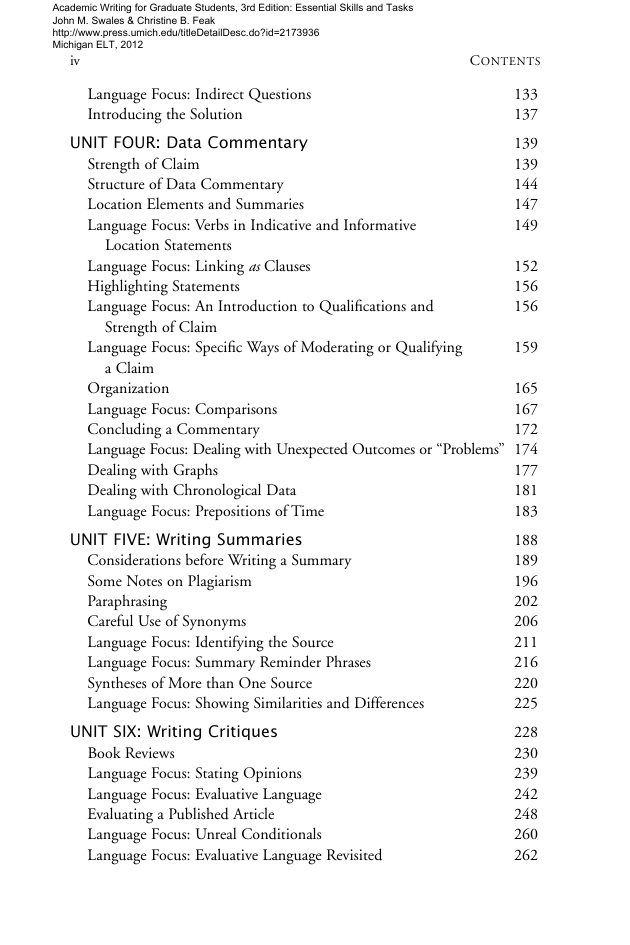
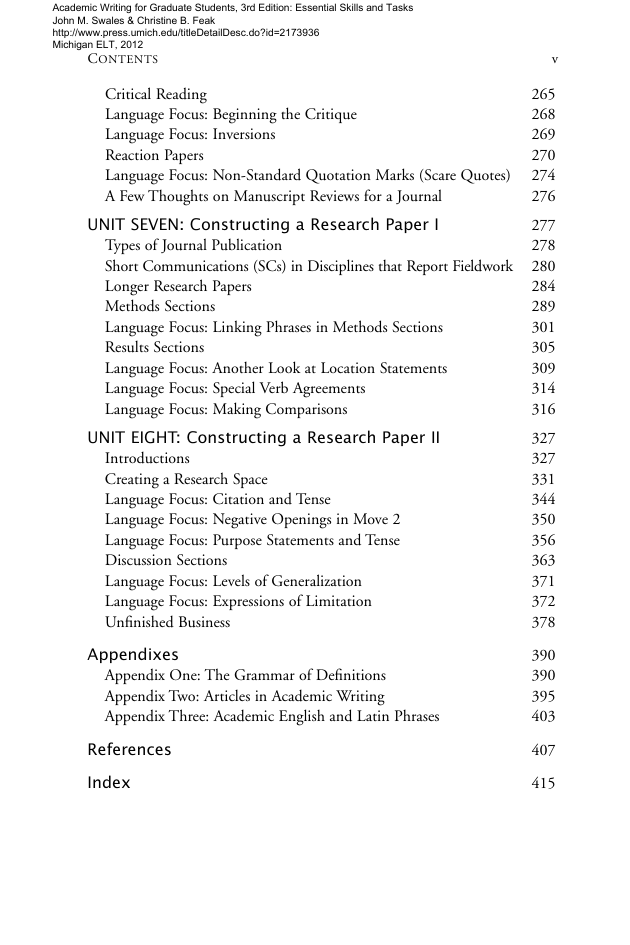

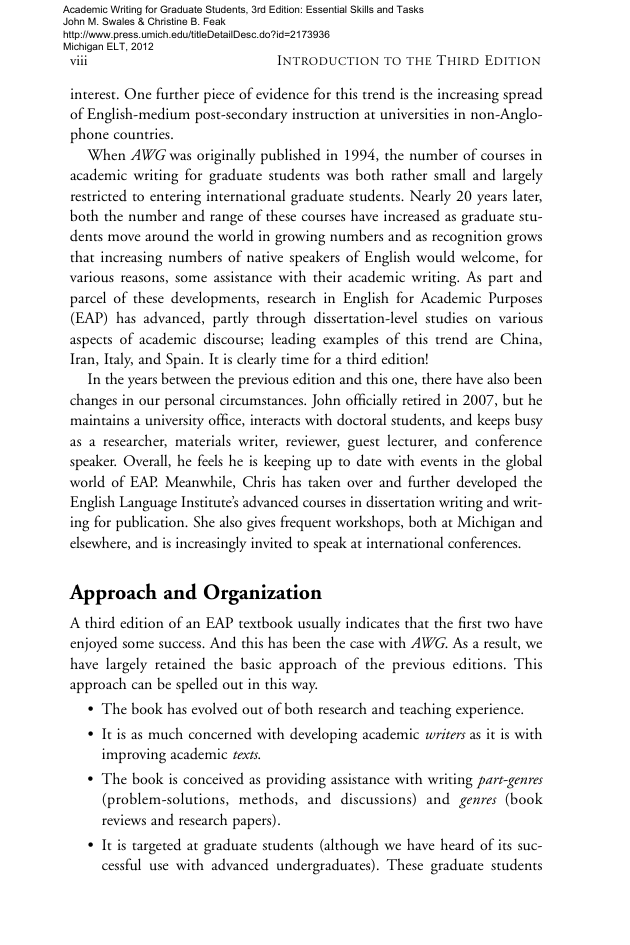
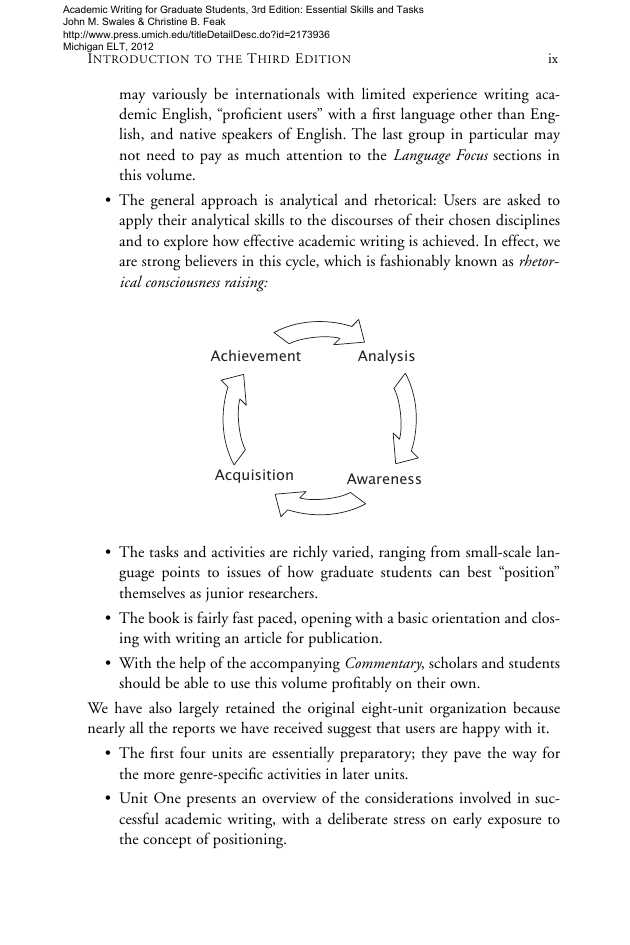
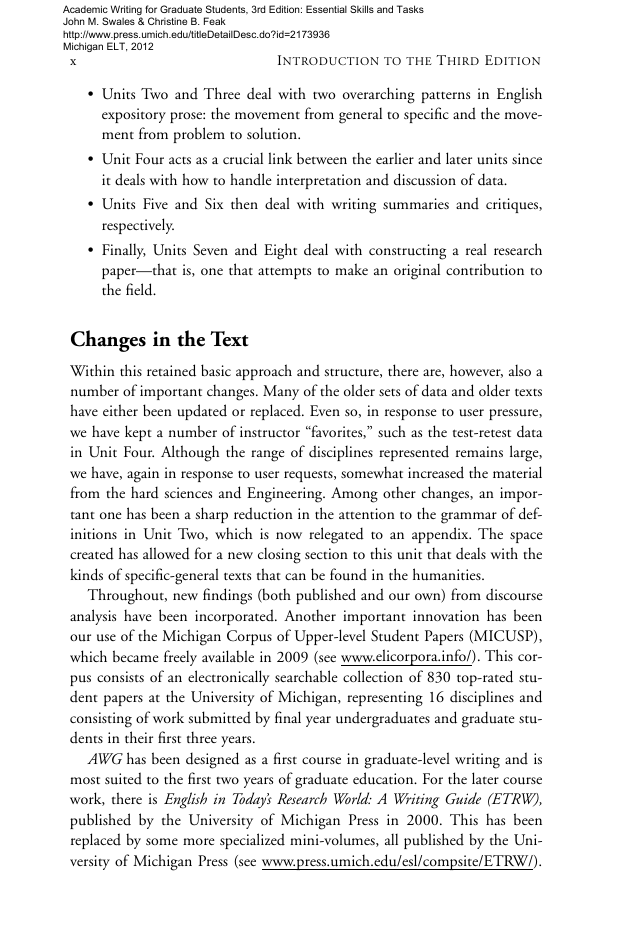








 2023年江西萍乡中考道德与法治真题及答案.doc
2023年江西萍乡中考道德与法治真题及答案.doc 2012年重庆南川中考生物真题及答案.doc
2012年重庆南川中考生物真题及答案.doc 2013年江西师范大学地理学综合及文艺理论基础考研真题.doc
2013年江西师范大学地理学综合及文艺理论基础考研真题.doc 2020年四川甘孜小升初语文真题及答案I卷.doc
2020年四川甘孜小升初语文真题及答案I卷.doc 2020年注册岩土工程师专业基础考试真题及答案.doc
2020年注册岩土工程师专业基础考试真题及答案.doc 2023-2024学年福建省厦门市九年级上学期数学月考试题及答案.doc
2023-2024学年福建省厦门市九年级上学期数学月考试题及答案.doc 2021-2022学年辽宁省沈阳市大东区九年级上学期语文期末试题及答案.doc
2021-2022学年辽宁省沈阳市大东区九年级上学期语文期末试题及答案.doc 2022-2023学年北京东城区初三第一学期物理期末试卷及答案.doc
2022-2023学年北京东城区初三第一学期物理期末试卷及答案.doc 2018上半年江西教师资格初中地理学科知识与教学能力真题及答案.doc
2018上半年江西教师资格初中地理学科知识与教学能力真题及答案.doc 2012年河北国家公务员申论考试真题及答案-省级.doc
2012年河北国家公务员申论考试真题及答案-省级.doc 2020-2021学年江苏省扬州市江都区邵樊片九年级上学期数学第一次质量检测试题及答案.doc
2020-2021学年江苏省扬州市江都区邵樊片九年级上学期数学第一次质量检测试题及答案.doc 2022下半年黑龙江教师资格证中学综合素质真题及答案.doc
2022下半年黑龙江教师资格证中学综合素质真题及答案.doc